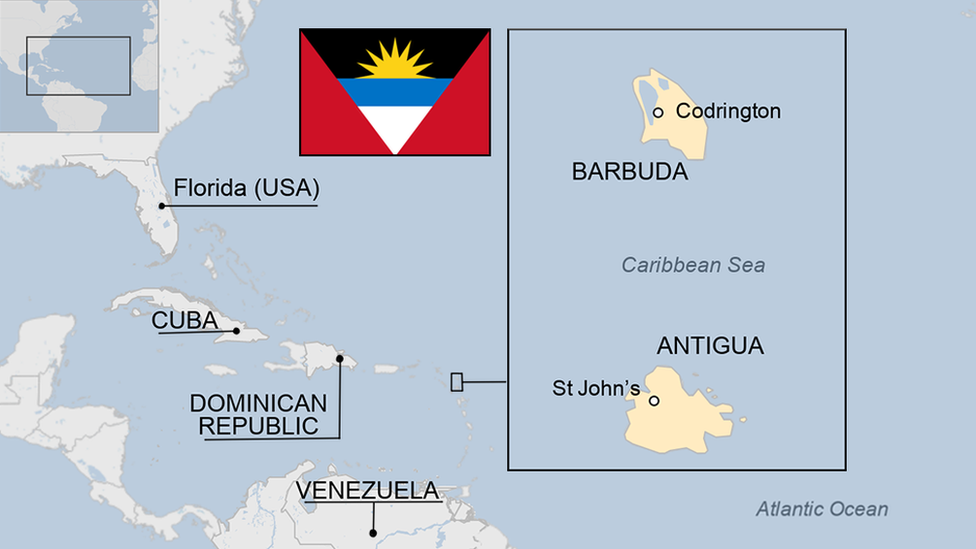Antigua's traditional bread shops struggle amid food price hikes
- Published
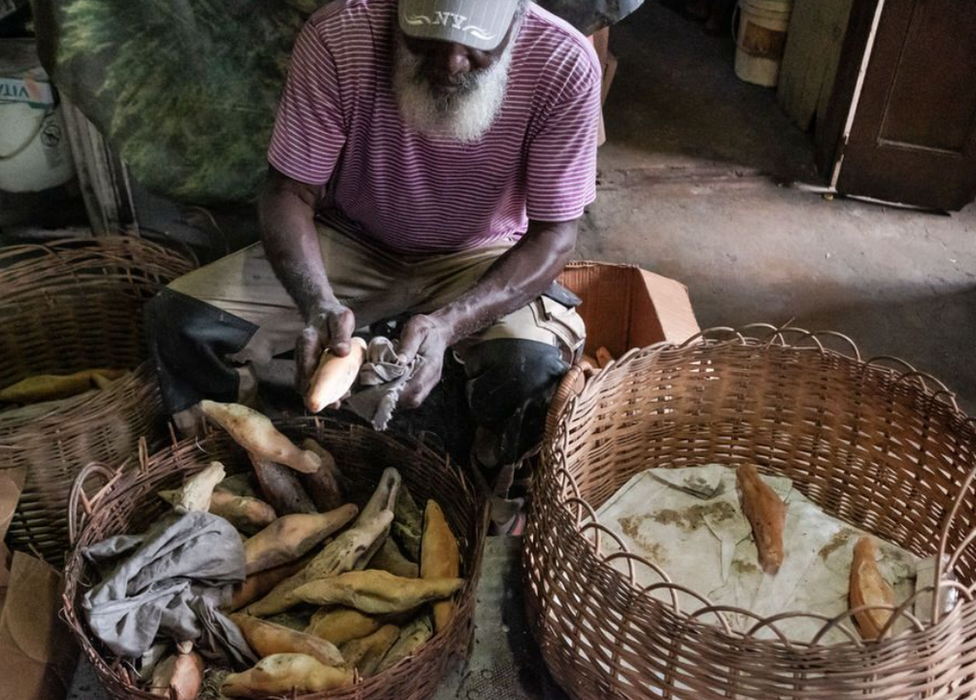
Breadmaking recipes and techniques have been passed down from African ancestors
Dawn has barely broken, and Alton's bakery in a side street on the outskirts of Antigua's capital is already abuzz with activity.
A baker is using a long plank to place loaves into a vast wood-fired oven. Someone else has the task of wiping the ashes off the bread when it comes out, filling the room with its comforting aroma.
In an adjacent room, two men are deftly shaping dough by hand into buns ready for the next batch.
Before the morning is out they will have made several hundred of these, to be sold in tiny family-run stores island-wide, or as breakfast for the hungry customers milling in and out, clutching still-warm loaves wrapped in brown paper.
Outside in the distance, a behemoth cruise ship looms, incongruous amid this tableau of simple wooden homes.
In the vibrant suburb of Gray's Farm, a world away from the white sand beaches and luxury resorts tourists flock to Antigua to enjoy, Alton's is a linchpin of community life.
It's an image mirrored across the Caribbean island where "bread shops" are as much a meeting point, a place to share gossip and a joke, as somewhere to grab an affordable snack.
Recipes and techniques - passed down from residents' African ancestors - and sometimes equipment too have remained unchanged for generations.
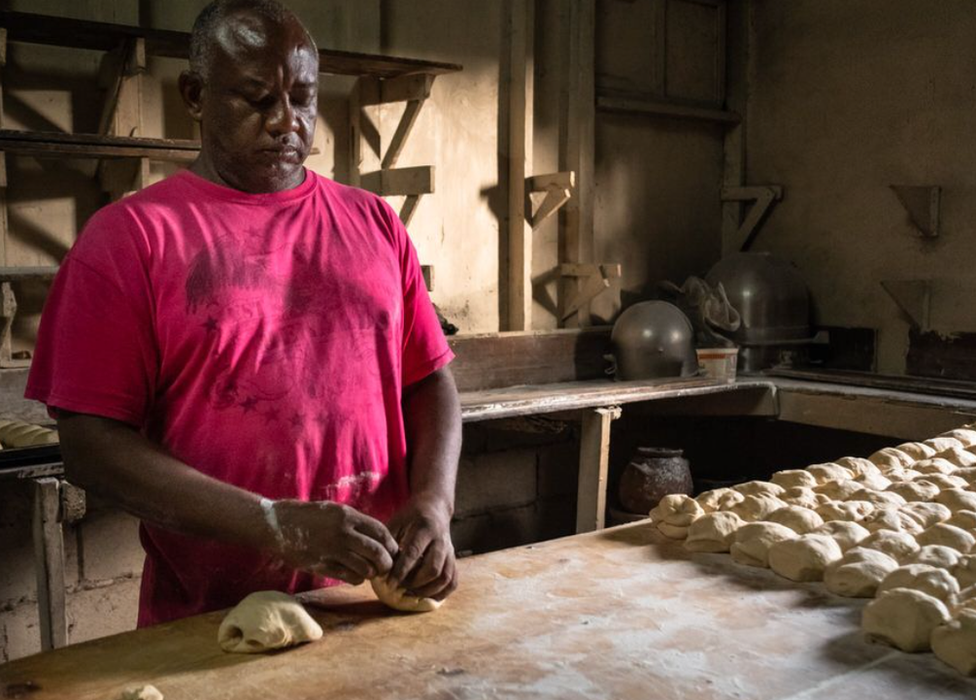
Rudolph Orr says people like his bread "for the smoky flavour and crunchy texture"
Rudolph Orr, whose family opened Alton's a century ago, rises at two in the morning seven days a week to start baking.
Over the last year, however, the soaring cost of flour has taken a massive bite out of the shop's meagre profit.
Like everywhere else, Antigua has been badly hit by the rising cost of living, exacerbated by the wheat blockades in Ukraine and many countries' subsequent curtailing of exports.
But for Mr Orr, passing on the extra costs to his customers is unthinkable.
"If we did, some families around here wouldn't be able to eat," he says. "We try to help the people. For a family of seven or eight, an extra dollar on each bread would be a big increase. We are helping them survive."
It's an ethos passed down to Mr Orr from his forefathers, along with the vintage tools he still uses to prepare his products.
Flour imported from neighbouring islands has almost doubled in the last 12 months.
Alton's has been forced to up its price by a nominal few cents - but a personal-size loaf, slathered with butter, cheese or salami, sells for the equivalent of just $0.75 (£0.62).
Wood-fired ovens are something of a dying tradition in Antigua. But, for the handful of bakeries that still use them, switching to a modern counterpart is inconceivable.
"Electric ovens are much easier and have less smoke," Mr Orr concedes. "But people like our bread for the smoky flavour and crunchy texture."
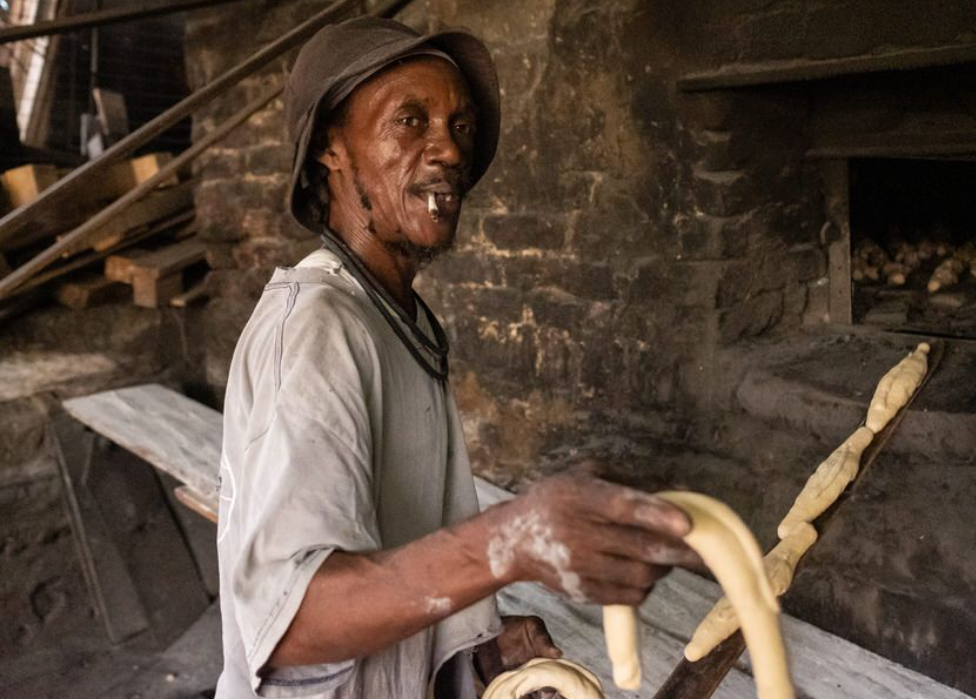
John Peters says he gets burnt all the time - but still prefers traditional tools
Kent Augustine, who is picking up a loaf on his way to work, says the use of local cassia and tamarind wood gives it a unique flavour.
"Prices have gone up everywhere but the bread is still very reasonable," he adds.
A contemporary oven would undoubtedly be safer, too. Baker John Peters laughs when asked if he ever gets burnt.
"All the time," he says, rolling up his sleeve to reveal the marks.
At another bakery closer to St John's, baker Tindell Joseph says the South Street bread shop has been a part of the community for decades.
Mr Joseph learnt the trade many years ago and says the only thing that has changed is the use of vegetable fat in place of lard.
"This place has a history," he tells the BBC, surveying the spartan surroundings comprising a large wood oven and long table used to knead and shape the dough.
"People used to come here to see the previous owner. I clown around, share a little chatter; people like that. I play music too - soft rock, reggae, calypso, words with a message. If no music is playing, people ask why," Mr Joseph grins.
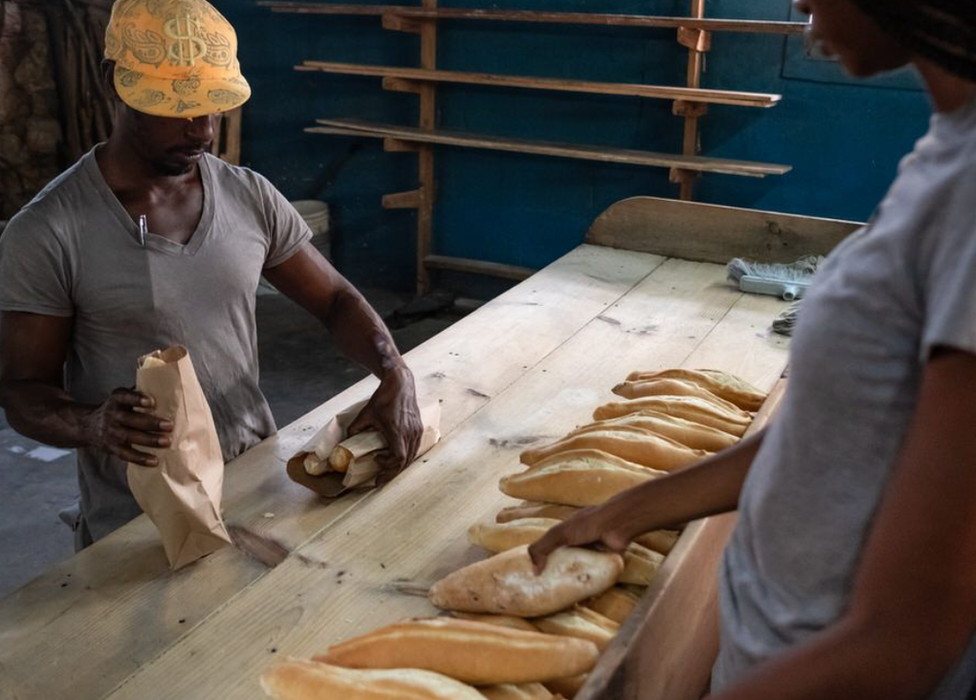
Local bakers are trying to keep customers happy in challenging times
Regular customers come from as far as the other side of the island to pick up their morning loaf before heading into St John's for work.
"Fridays to Sundays are our busiest days. People come in to buy bread to eat with their Sunday breakfast of saltfish and greens," he says.
Bakery owner Lolita Peters bought the business five years ago when food prices were still relatively stable.
In addition to flour, sugar has also increased by 25%, she says.
"We've had ups and downs, but the bakery means a lot to the community and the country at large. They say my bread is the best," Ms Peters explains.
"I only put my price up a little because I consider there are two of us in the business - the customer and I - and up to now the customer is still on the same wage as before.
"They appreciate that; lots of them come and thank me."
What the future holds for these traditional shops in the face of unprecedented financial challenges, coupled with an ageing generation of old-style bakers, no-one really knows.
Ms Peters' granddaughter Ariel Hughes has been helping out at the South Street outlet for most of her life. But, at 18, she has other ambitions.
"I plan on living abroad so I will not be doing this," she says. "I want to learn cosmetology and do makeup, hair and lashes."
Ms Peters says she hopes one of her other grandchildren will eventually take over the bakery, but adds: "It seems like they have other interests."
At Alton's, Mr Orr says he's tried in vain to convince his 22-year-old son to learn the trade.
"I try to teach him," he says, over the noise of a chicken that has wandered in, announcing its arrival with a loud squawk.
"I tell him some day this will be his, but he seems more interested in modern things."
Related topics
- Published6 July 2022

- Published25 August 2023
